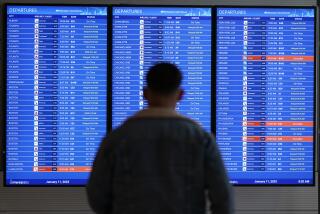Report Says Air Cargo Is Vulnerable
- Share via
WASHINGTON — Though air travelers may feel more secure now that scissors and knives are confiscated and all luggage is checked for bombs, uninspected cargo in the belly of planes remains an inviting target for terrorists, congressional investigators conclude in a report to be released today.
More than 20% of all air cargo is transported on passenger flights, but virtually none of it is screened for explosives, the General Accounting Office found.
“It’s the only hole left in our aviation system,” said Sen. Kay Bailey Hutchison (R-Texas).
Figures compiled by the Air Transport Assn., a trade organization for the leading U.S. airlines, show that from January through November 2002, airlines moved more than 21.3 billion revenue-ton-miles of cargo. (A “revenue-ton-mile” is defined by the Department of Transportation as one ton of payload transported one mile.)
Hutchison and Sen. Dianne Feinstein (D-Calif.) were the principal sponsors of legislation to improve air cargo security. Although the bill passed the Senate, it failed to garner support in the House. The two senators hope that the results of the probe by the GAO, the investigative arm of Congress, will build new momentum for the legislation.
The lack of safeguards for cargo is widely recognized as a significant loophole in the aviation security legislation passed by Congress in the aftermath of the Sept. 11 terrorist attacks. At the time, lawmakers were focused on preventing another suicide hijacking and did not focus on the more mundane issue of checking parcels.
“With bombs equipped with some kind of sophisticated timing device, we could have eight or nine flights destroyed and no terrorists killed,” said a congressional official who is familiar with the study and who asked not to be identified. “That would be the end of our aviation industry.”
Cargo accounts for about 10% of passenger airline revenue, and the cash-strapped industry cannot afford to stop transporting freight. Until now, airlines have relied on established business relationships with shippers that can vouch for the safety of the cargo.
But according to a summary of the report, that system has serious vulnerabilities, GAO investigators found. “The bottom line is that shippers are not accountable,” said the congressional official.
Air cargo can be tampered with while it is being transported to the airport, or while it is warehoused at cargo handling facilities, the report said.
The cargo facilities are particularly weak links, the report concluded. There are about 10,000 such warehouses around the country, operated by companies known as freight forwarders. These intermediaries consolidate cargo from many shippers and deliver it to the airlines.
Freight forwarders are required to have government-approved security plans, but GAO investigators found weaknesses in those regulations.
For example, the GAO found that freight forwarders are not required to check and record identification information for employees of shippers delivering cargo to their facilities. Someone impersonating an employee of a shipper could enter a warehouse, plant a bomb in a shipment and depart without leaving a trace.
“Freight forwarders and airlines are not required to check very basic information for employees of known shippers,” said the congressional official. “It’s easy to get a fake ID, enter a facility and tamper with the cargo -- without that tampering ever being detected.”
GAO investigators also questioned the adequacy of background checks for employees of the freight forwarders, noting that the industry is plagued by thefts, often carried out with inside help.
Although the Transportation Security Administration has tried to tighten rules for freight forwarders, GAO investigators said security violations remain commonplace.
Despite the continuing concern about cargo, it’s unlikely that all shipments will one day be screened with explosives-detection technology, as all checked passenger luggage has been since the beginning of the year. Such a screening system for cargo is seen as too cumbersome and expensive.
Instead, the GAO recommends much tighter controls over the current system, including background checks for cargo handlers, tamper-proof identification cards, better physical security at warehouses and better enforcement of current rules.
More to Read
Sign up for Essential California
The most important California stories and recommendations in your inbox every morning.
You may occasionally receive promotional content from the Los Angeles Times.













